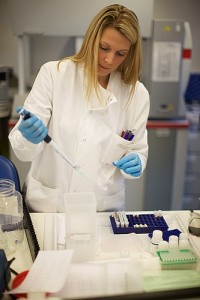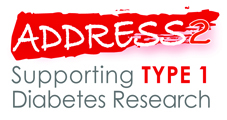NOTE: Some studies below remain temporarily suspended due to the ongoing circumstances relating to COVID-19. Recruitment may also be staggered across sites.
The following are studies for which the research teams are using ADDRESS-2 to find and contact candidates
INNODIA: 
An innovative approach towards understanding and arresting type 1 diabetes
Recruiting to September 2021
Summary
Europe-wide study collecting blood samples and data from people newly diagnosed with type 1 diabetes and first degree relatives, aged 1-45 years.
Aim
To develop a European infrastructure for the recruitment of newly diagnosed patients with type 1 diabetes (T1D) and unaffected family members, generating an unrivaled Bioresource for T1D discovery science.
Contact us
Call: 01223 768616
Email: INNODIA-recruit@paed.cam.ac.uk
Website
Study outline
INNODIA will collect blood samples and data throughout Europe from newly diagnosed patients with type 1 diabetes and first degree relatives of people with type 1 diabetes to study and understand the development and progression of the disease. INNODIA participants will form a large European resource (living Biobank) where their samples can be analysed and used by scientists and doctors to further their understanding and help design clinical trials to arrest or stop type 1 diabetes from occurring.
We plan to recruit 1500 children and adults aged between 1 and 45 years who have been diagnosed with T1D within the previous 6 weeks and 3000 first degree relatives of people with type 1 diabetes, also aged between 1-45 years who may be at risk of developing type 1 diabetes in the future.
Eligibility to take part
Newly Diagnosed individuals with type 1 diabetes
1. Age 1-45 years
2. Diagnosed with type 1 diabetes in the last 6 weeks
First degree relatives of people with type 1 diabetes (unaffected family members)
1. Age 1-45 years
2. Have a first degree relative with type 1 diabetes (parent, child, full or half siblings) diagnosed less than 45 years of age
What will I/my child be asked to do?
Newly Diagnosed individuals with type 1 diabetes
The first visit will need to be within 6 weeks from when you were told you had diabetes and then at 3, 6, 12 and 24 months from diagnosis. At each visit you will have blood samples taken and a mixed meal tolerance test will be performed at visit 2 and at each visit until the end of the study. A mixed meal tolerance test can tell us how much insulin your body is still making.
Between the hospital visits and up until the end of the study we will ask for a tiny sample of your blood to be collected every 4 weeks by finger prick at home. We call these samples dried blood spots.
First degree relatives of people with type 1 diabetes (unaffected family members)
We will ask you to attend a screening visit which will take about one hour, where a sample of your blood will be taken for genes and autoantibody testing.
The results of these tests will be available within 3 months. Depending on the results you may or may not be invited for further study visits.
If your autoantibody results are negative
We will send you a health questionnaire, each year for 4 years or until the end of the study. We may ask you to provide further samples to compare results from people with type 1 diabetes and those from family members who do not have type 1 diabetes.
If your autoantibody results are positive
We will invite you to come to hospital for a further 7 study visits over 4 years. At each visit we will take blood samples and perform an oral glucose tolerance test which can tell us how good your body is at making insulin.
Between the hospital visits and up until the end of the study we will ask for a tiny sample of your blood to be collected every 4 weeks by finger prick at home. We call these samples dried blood spots.
Study locations
This study is open across around 21 sites across England and Scotland. For a full, current list of sites please see the INNODIA study website map.
Who is running this study?
This study is sponsored by Cambridge University Hospitals NHS Foundation Trust and the University of Cambridge UK.
This project has received funding from the Innovative Medicines Initiative 2 Joint Undertaking under grant agreement No 115797 (INNODIA). This Joint Undertaking receives support from the European Union’s Horizon 2020 research and innovation programme and European Federation of Pharmaceutical Industries and Associations (EFPIA), Juvenile Diabetes Research Foundation (JDRF) and The Leona M. and Harry B. Helmsley Charitable Trust.
PROTECT: 
A Phase III, Randomised, Double-Blind, Placebo-Controlled Study to Evaluate Efficacy and Safety of Teplizumab (PRV-031) in Children and Adolescents with Newly Diagnosed Type 1 Diabetes (T1D)
Recruiting to October 2020
Summary
The PROTECT Study is testing how well an investigational medicine works in children and adolescents with type 1 diabetes (T1D).
Aim
The PROTECT Study will assess how well an investigational medicine, called teplizumab, works in children and adolescents recently diagnosed with type 1 diabetes. ‘Investigational’ means that the medicine has not been approved for the treatment of T1D and is still being evaluated in clinical studies such as this one. The investigational medicine will be compared with a placebo—a substance that looks like teplizumab but contains no real treatment. The PROTECT study will also assess whether there are any side effects from taking the investigational medicine.
Contact us
Email: T1D Consortium
Website
Eligibility to take part
1. Aged 8-17 years old
2. Diagnosed with type 1 diabetes in the last 6 weeks
3. Positive for 1 of 5 autoantibodies (test to be done as part of study)
4. Ability to produce a minimum amount of your own insulin (test done as part of study)
5. Otherwise generally healthy, with no other significant medical conditions, recent or history of infections or taking medicines that might interfere with teplizumab
What will I be asked to do?
If you or your child are eligible to take part in the PROTECT Study, you or your child will be placed into one of two study treatment groups. Two thirds of participants will be assigned to the teplizumab group and one third will be assigned to the placebo group. This is decided at random, like drawing straws. Neither you, your child, nor the study doctor will know to which study treatment group you or your child have been assigned. This ensures that the results from the different groups will be handled in the same way.
You or your child will receive two courses of study medicine over the duration of the study. Both the investigational medicine and placebo are given by intravenous (IV) infusion. This means a needle will be inserted into a vein, usually in the arm, and the liquid medication supplied continuously.
In this study, the IV infusion is given daily for a period of 12 days on two separate occasions, 6 months apart; the infusions will usually last for about 30 minutes. Further details of how and when to take the investigational medicine or placebo will be given by the study team.
Study Locations
- Sheffield Children’s NHS Foundation Trust
- Cardiff & Vale University Local Health Board
- London North West University Healthcare NHS Trust
- University Hospitals of Leicester NHS Trust *
*Temporarily closed
Who is running this study?
This research study is being conducted and funded by Provention Bio, Inc.
IMPACT: Phase Ib/IIa, randomized, double-blind, multicenter clinical trial to evaluate the immune  signature of the treatment with the Imotope™ IMCY-0098 and its effect on the preservation of beta-cell function in young adult and adolescent patients with a recent onset Type 1 diabetes
signature of the treatment with the Imotope™ IMCY-0098 and its effect on the preservation of beta-cell function in young adult and adolescent patients with a recent onset Type 1 diabetes
Recruiting until June 2022
Summary
This is a Phase Ib/IIa randomised, double-blind, multi-centre, adaptive design study, comparing IMCY-0098 and placebo in adult and adolescent participants with recent onset Type I diabetes (T1D). This study is designed to be conducted in two steps. We are currently recruiting to step 1. The purpose of this study is to explore the best dose and number of administrations (i.e. the best treatment regimen) and to confirm that the study drug is effective when used in the best regimen.
Aim
This study aims to evaluate the effect of IMCY-0098 on the immune signature (treatment-specific biomarkers) and the effect of the study drug upon the preservation of beta-cell function in adolescents and young adult patients with Type 1 Diabetes. Further safety data will also be collected.
Contact us
Email: T1D Consortium
Eligibility to take part (Step 1)
1. Aged 18-45 years old.
2. Diagnosed with type 1 diabetes in the last 9 weeks.
3. Positive for 1 or more islet autoantibody.
Step 1 will include 24 patients. Step 2 will include 60 participants in two sub-groups (patients aged 12-17 and those aged 18-45).
What will I/my child be asked to do?
Step 1 will include 24 patients aged 18-45 who will be randomised 1:1:1 to treatment with 450 μg IMCY-0098 or 1350 μg IMCY-0098 or placebo, at 2-weekly intervals, for 6 treatments. Patients will undergo 10 study visits, including screening and randomisation visits, over a period of approximately 52 weeks.
Step 2 patients will be randomised 1:1:1 to receive either: A) IMCY-0098 regimen with IMCY-0098 boost or B) IMCY-0098 regimen with PLACEBO boost or C) Placebo regimen with placebo boost. During the treatment period / regimen, study drug or placebo will be given at 2-weekly intervals for a maximum of 6 administrations. All boosts will be given at 24 weeks. The number of treatments and the dose of IMCY-0098 to be used will be confirmed following the outcome of step 1 of the study and prior to implementation of the second step of study.
Step 2 participants will have an additional study visit to receive a “boost” treatment (placebo or IMCY-0098) 24 weeks after the initial treatment and will therefore undergo 11 study visits over a period of approximately 52 weeks.
Study locations
- Oxford University Hospitals
- Cardiff & Vale University Local Health Board
- Addenbrooke’s Hospital, Cambridge
- Barts Health Trust, London
- Royal Victoria Infirmary, Newcastle
- Royal Devon and Exeter Hosptial, Exeter
- Guy’s and St. Thomas Hospital, London
- St. Georges Hospital, London
- Leeds General Infirmary
- Leicester Royal Infirmary
- Edinburgh *
* Due to open
Who is running this study?
The study is sponsored and funded by Imcyse SA.
MFCI:
Changes in male fertility during chronic illness
Recruiting until 31 December 2021
Summary
Observational study for males with type 1 diabetes aged 18-60 years.
Aim
To study which blood cells in the immune system are involved in the destructive process that occurs to the insulin-producing cells of the pancreas and how it happens.
Contact us
Email: c.jayasena@imperial.ac.uk
Eligibility to take part
1. Male
2. Aged 18-60 years
3. Diagnosed with type 1 diabetes in the last 6 months
What will I be asked to do?
The study will involve you attending a screening visit. You will be asked questions about your medical. You will be asked to give a blood and semen sample to analyse hormone levels and sperm count, respectively. If you are diabetic you may be asked to preform continuous glucose monitor (CGM) for 10 days.
Who is running this study?
This study is organised by Imperial College London, and is funded by a research grant from Imperial College.
The main hospital for the study is Hammersmith Hospital, London.
T Cells in Type 1 Diabetes
Recruitment is suspended
Summary
Observational study for adults with type 1 diabetes aged 18-40 years.
Aim
To study which blood cells in the immune system are involved in the destructive process that occurs to the insulin-producing cells of the pancreas and how it happens.
Contact us
Email: diabetesresearch@gstt.nhs.uk
Eligibility to take part
1. Age 18-40 years
2. Diagnosed with type 1 diabetes (both within the last 12 months and more than 12 months)
What will I be asked to do?
The study will involve you having an injection every 1-3 months with either the study medicine, Ustekinumab or a placebo (a “dummy medicine”). These injections are given under the skin just like insulin injections and will be done by the study doctor or nurse. Neither you nor the research team will know if you receive the study medicine or the placebo.
Who is running this study?
This study is being run by King’s College London and Guy’s and St Thomas’ NHS Foundation Trust. The Chief Investigator is Prof Mark Peakman and the Co-Investigator is Dr Jake Powrie.
It is funded by the Juvenile Diabetes Research Foundation and Diabetes UK.
The main hospital for the study is Guy’s Hospital, London.
Diabetic Twin Study: A study of epigenetics of type 1 diabetes using identical twins
Recruitment is open
Summary
Observational study for identical twins
Aim
To study the influence of environment and genes on the onset of type 1 diabetes using identical twins.
Contact us
Call: 020 7882 2365 Dr Mohammed Hawa, Study Manager
Email: m.i.hawa@qmul.ac.uk
Eligibility to take part
Identical twin pairs where one twin has type 1 diabetes and the other does not.
What will I be asked to do?
You will be asked to give a blood sample and a mouth swab sample. You will be asked about your health.
Who is running this study?
This study is being run by Queen Mary University of London. The Chief Investigator is Prof David Leslie.
It is funded by the Juvenile Diabetes Research Foundation.
Participants will be asked to visit St Bartholomew’s or The Royal London Hospital.


 signature of the treatment with the Imotope™ IMCY-0098 and its effect on the preservation of beta-cell function in young adult and adolescent patients with a recent onset Type 1 diabetes
signature of the treatment with the Imotope™ IMCY-0098 and its effect on the preservation of beta-cell function in young adult and adolescent patients with a recent onset Type 1 diabetes

